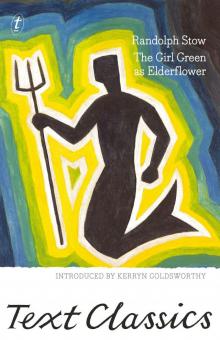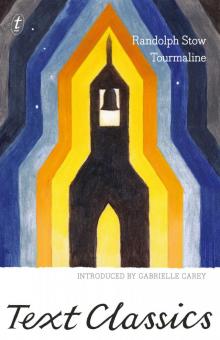- Home
- Randolph Stow
The Girl Green as Elderflower Page 6
The Girl Green as Elderflower Read online
Page 6
In the hall below Amabel and Mikey sat at the table, while their mother’s daily aide whisked about them with duster and broom. ‘I don’t know, I’m sure,’ she said, ‘why you sit here just when I’m busy. It’s a lovely morning out, if you wrap up well.’
‘We’re waiting, Mrs Kersey,’ said Mikey. ‘We’ve been waiting since breakfast.’
‘For a friend,’ explained Amabel, ‘who is coming to play.’
‘Well, the play-room is tidy,’ said Mrs Kersey, ‘and I’m sure that’s easier to keep warm. That fire make so much dust in here.’
As the rosy woman, with duster and furniture-polish, was addressing herself to the oak settle, a voice said out of the air. ‘Did you ever find your ring, Kitty Kersey?’
Mikey ran to the door, yelling: ‘Lucy! Lucy!’ And Mrs Kersey suddenly found Amabel beside her, holding her protectively by the hand.
With the smile of someone whose good humour was being tested in public, Mrs Kersey gazed about the ceiling. ‘Am I on Candid Camera?’ she asked. ‘Well, if that’s you, Mark, I’ve heard of tape-recorders before.’
‘It int Mark,’ said the voice from the air. ‘You don’t know me, but I know you, Kitty Kersey.’
‘It’s that familiar,’ said Mrs Kersey. ‘If it’s you, Lucy, I shall give you a good slap.’
‘It int Lucy, neither,’ said the voice. ‘Lucy’s just now coming.’ And a moment later the brown girl arrived in haste.
‘Is it Malkin?’ she panted out to Amabel, and the other girl nodded her pale gold head.
Mrs Kersey’s tolerant face was beginning to look imposed upon, and she said a little fretfully: ‘If it’s a joke, there’s jokes that go off, like milk.’
‘Now then, Kitty Kersey,’ said the sprite, ‘don’t get your knickers in a twist. There int so many people see as are sin, and I believe I’ve sin you about for a year or two. Not to mention the times I’ve heard your name from Bill Brooks up at the forge. Old Bill he say: “If ever I marry again,” he say, “Kitty Bugg that was will be the bride, and no other won’t do.”’
‘The cheek of him,’ bridled Mrs Kersey. ‘He’s got no right to be making so free with my name, and he can’t say that I ever give him encouragement.’
‘I don’t say you do, gal,’ answered Malkin, ‘and he don’t say so, and he only talk like that to his old mother, and she’s as deaf as a beetle. But old Bill, he int such a bad old boy, and he fancies you something comical, and widowers int so thick on the ground as widows. There’s others would have him, and Margery Mill is one.’
‘She’s very welcome, I’m sure,’ said Mrs Kersey.
‘I’ll tell you something,’ said Malkin, ‘I hear about Margery Mill. Cor, I thought I’d die laughing. It was during the war, you see, when the Yanks was about with lots of money, and that Margery Clegg, she was then, she give herself a bath in milk. A bathful of milk, I ask you, would you credit it? Iss, she bathed in milk to make herself more beautiful.’
‘She never!’ cried Mrs Kersey, with joyous laughter. ‘Oh, I don’t believe it. How could you know such a thing?’
‘I was in her sister’s house,’ said Malkin, ‘when she tell her husband that story, and I had to go away because I thought they’d hear me laughing. There int many I talk to,’ explained the sprite, ‘and none that see me. But a house like this, with children in it, is kind of cheery, and it’s dismal-like at ours.’
‘Malkin,’ said Lucy, ‘where do you live?’
‘Here and there, dear gal,’ said the sprite, ‘here and there. I’ve been at Kitty Kersey’s before now, when her daughter was younger. I sin Kitty lose her ring, and I know where it is.’
‘My ring?’ cried Mrs Kersey.
‘Iss,’ answered Malkin, ‘that cheap little old ring your Tom give you when you was walking out. That roll under your bed and down a crack, and if your son-in-law lift a board, there it will be.’
While Mrs Kersey exclaimed her thanks, Amabel was watching the stairs. The tall priest was descending, with a thoughtful face, and fingering his lip.
‘Morning, Mrs K.,’ he said absently; and then, puzzled by the scene in the hall: ‘Was it me you were speaking to then?’
‘Oh, it’s just some game,’ said Mrs Kersey, ill at ease. ‘No, I didn’t even see you there.’
Malkin said distinctly: ‘Abes, praelonge!’
‘Excuse me?’ said the priest, looking amazed. ‘What was that?’
Again the high, childlike voice cried out commandingly: ‘Abes, praelonge!’
‘I see,’ said the priest, looking, however, quite baffled. ‘Mark has taught one of you to say—er—“Make off, Lofty!” in Latin.’
‘Mentiris,’ said Malkin irritably. ‘Marcus haud Latine loqui potest.’
‘It’s got to be Mark,’ said the priest, more and more uncomfortable. ‘How are you doing that voice, Mark? Where are you hiding?’
‘Attende,’ said Malkin, with authority. ‘Aliquid tecum volo disceptare.’
Suddenly the large man drifted across the room, his soles an inch from the floor, and disposed himself upon the settle. He sat blank-faced and with twitching fingers while the sprite poured over him a stream of Latin.
‘Satis!’ he protested at last, raising a hand in surrender. ‘Vicisti. Amplius non possum.’
‘It do go on,’ said Mrs Kersey sympathetically. ‘But why don’t you speak English to the gentleman? It can,’ she explained. ‘It’s proper Suffolk.’
‘Tell us what it said, Father Jacques,’ Lucy called out. ‘Tell us what Malkin said.’
‘Malkin?’ he repeated. ‘Is that what you call it: Malkin?’
From high in the ceiling, the width of the room away, came the cuckoo-call.
‘Malkin,’ said Mrs Kersey. ‘A real old country word that is. My granny used to call a scarecrow a mawkin.’
‘I int no scarecrow, gal,’ said the sprite. ‘I’m a bouncing baby.’
‘A baby!’ the priest exclaimed; while Lucy asked, tenderly: ‘Are you a boy or a girl?’
‘Did you ever hear,’ demanded the testy spirit, ‘of a boy called Malkin, you noddy?’
‘But Malkin,’ said the priest, looking up at the ceiling with troubled eyes, ‘Malkin, you just preached me a sermon in Latin on the doctrine of original sin, and on the possibility of the redemption of Satan at the Last Day, and you supported your argument in favour of that hypothesis with considerable learning, as far as I could follow.’
‘We int all Swedes in Suffolk,’ said the spirit-child.
‘Malkin, how old are you?’ asked Mikey, his favourite question.
‘Thass a bit hard to say, dear boy,’ replied the sprite. ‘But if you all will listen to me right quiet, I shall tell you how I come here.
‘I was born,’ she said, ‘in Lavenham, and my mam was miserable poor. One day she took me to the beet-field, where she was hoeing weeds for the farmer, as I expect you’ve sin the gypsy women doing, young Mikey. I was one year old, and I never give her much trouble. So she put me down to sleep under an ash tree at the edge of the field, and she and the other women got on with the work.
‘Well, I don’t remember a lot, but I woke up and I was crying. An ant had bit me or summut like that, and I skreeked. I bellowed like I’ve heard you do, you young foghorn. And all of a sudden this woman come, and she grab me.
‘I was wholly surprised, because this old gal warnt nothing like my mam. And I held my noise, I was that frightened I had to.
‘Well, this old gal she take me hoom with her, and I live there still. I won’t tell you where, but that int so very far from here. The old gal she don’t treat me too bad, and I’ve had some jokes with her son, the young layabout, and I call them my mother and brother, though they int.
‘But one thing that make them awkward, thass me going out to the houses of human beings. That get right up their noses, that do, they being differently made. Oh, I shall be jawed tonight when I go hoom, and I hope he don’t take his belt to me. The old gal, you see, she’s a w
itch, and so is he.’
The spirit paused, and after a moment Lucy asked gently: ‘Are you always invisible, Malkin?’
‘No, gal, I int,’ said the sprite. ‘But I steal their cap, and thass what it mainly is that get their rags out. They have this cap, you see, that make you invisible. Many’s the hiding I had, Kitty Kersey, for the time I spent with your daughter.’
‘And how long,’ asked Lucy, ‘have you lived in their house?’
‘Seven year,’ said Malkin, and her bright voice grew drab with sadness. ‘I thought when the seventh year was up I should go hoom. But all my hopes was dashed, as the saying goes. So here I am waiting for seven more years from now. Or it might be seven from then, or seven from that, or never.’
‘Oh Malkin, Malkin,’ said Lucy, with misty eyes.
‘Cheer up, my treasure,’ said Malkin; ‘it int so bad being a witch. But I’m still very young, and my heart’s with mankind, somehow. I should like to live among them, and be one myself. Ad prist inam hominum cohabitationem,’ she elaborated to the priest, ‘volo reverti.’
‘My child,’ said the priest, in halting and canine Latin, ‘are you a Christian?’
‘I believe I am,’ she replied in the same tongue. ‘Why do you ask?’
‘There is a man upstairs whom you might console.’
‘When the time is ripe,’ said the spirit-child, ‘and he will welcome me. Then I will go with him hand in hand, to the gate.’
‘God bless you, Malkin,’ said the big man, in English. ‘I’d like to kiss you for that.’
‘Malkin,’ said Lucy, ‘Malkin, may I kiss you?’
‘Not yet, gal, not yet,’ said the invisible child in a whisper. When her voice came again it was far away in the air. ‘What kind of thanks is that, to make Malkin cry?’
With the weeks that passed, as the garden beneath the sick man’s windows swelled into spring, the company of Malkin became such a habit with the household that its mistress would say, not looking up from her recipe-book: ‘Be an angel, Malkin, go and pinch me some tarragon from Lady Munby’s.’ Or Mrs Kersey would say: ‘Malkin, take this duster, gal, and do the picture rails.’ For such tasks the sprite received her meals, which were always placed on the settle in the hall, and which simply disappeared, though half a dozen pairs of eyes watched like kestrels.
She would come upon them also far from the house. One black night Mark was walking down Hole Lane to visit a friend at the farm, picking his way with tentative feet through dark so intense that he could distinguish nothing. Suddenly it seemed to him that the echoes of his footsteps between the budding trees had themselves an echo, that he was followed. From the thought of that person or fiend, his mind turned in a moment to Old Shuck, the fiend-dog. Presently he was certain that he could hear slavering snorts from its muzzle, below the flaming eyes.
Then a high clear voice that he knew began to sing.
‘Still, be thou still,
Poorest of all, stern one;
Nor shalt thou, Old Shuck,
Moot with me no more.
But fly, sorrowful thing,
Out of mine eynesight,
And dive thither where thou
Man may domage no more.’
‘Malkin, you bitch,’ the long youth said. ‘Then it was you I heard making Shuck noises behind me.’
‘Only little ones,’ said the sprite. ‘I just wanted to terrify you a bit.’
‘That was friendly,’ said the young man. ‘What a queer old charm you sang then. As if you were sad for the shuck-dog.’
‘So I am, boy,’ said the invisible child. ‘Thass a poor old miserable thing, the shuck-dog. That roam over Suffolk and Norfolk with its eyes on fire and its mouth dripping, big as a calf, scaring people to death. And thass ever so unhappy.’
‘Malkin, do you know Old Shuck?’
‘Of course I know him,’ Malkin said impatiently. ‘And right sorrowful he is without his master. Never got over the death of his master, Old Shuck didn’t. His master was the god Odin over in Denmark. Know Old Shuck? I should just think I did. And the Nun of Bures, and the Hairy Presence, and the Knights Templar of Coggeshall, and I don’t know how many more.’
‘Malkin,’ said Mark, ‘do demons and ghosts—and sprites—necessarily tell the truth?’
‘No, mate, we don’t,’ said the sprite. ‘But I’m telling you history, if you’d wash out your brains and listen.’
The young man walked on, until the trees were behind him, and the farm, dim but distinct, spread out below. ‘Good night, Malkin,’ he said, though he sensed that she was gone. When he arrived at the cottage, his friend stared at the daisy-chain with which Malkin had crowned his hair.
*
The narrow timbered house in a Lavenham street was leaning at all sorts of impossible angles, but looked sound and lovingly cared for. Knocking at the heavy door, the priest noticed clean white curtains beside him, and between them a proudly blooming hyacinth.
At his second knock the door opened. He thought at first that he had made a mistake, and asked uncertainly: ‘Mrs Burrows?’
‘Yes,’ said the young woman. She was not more than twenty-one, neat in her dress, her black hair carefully arranged.
‘I’m sorry,’ the priest said, ‘to turn up like this on your doorstep without warning. But I’d be grateful if you would spare me a few minutes to discuss something, out of the street.’
‘I’m not—’ the young woman began to say. But reflecting, she stepped back and led him into the tiny hall which had been contrived in the old cottage. From there she led the way into her front room, which the priest found solidly furnished, not quite according to his own taste, but showing a modest prosperity.
He took the chair she offered, and said: ‘This visit must be something of a surprise.’
The woman sat down opposite him, not curious, her face rather bland. ‘I should think it would be on account of some girl,’ she said, ‘and one of my brothers.’
‘There is a girl involved,’ said the priest. ‘A very young girl. Mrs Burrows, I learn from my inquiries that seven years ago you became the mother of a daughter called Mary, or Malkin.’
The woman immediately became sullen, which brought out a childishness in her face. ‘I don’t see how that come to be a concern of yours.’
‘You were extremely young,’ suggested the priest.
‘I was fourteen,’ said Mrs Burrows. ‘Are you going to ask if I was married?’
‘No, Mrs Burrows, I know the answer to that. I also know that the child mysteriously vanished.’
‘No one can’t blame that on me,’ the young woman said, a shrillness in her voice. ‘I know there’s plenty would like to believe I dropped her in a pond or something. But I was in the middle of a field with three other women when that happen. They all live here, they all will vouch for me.’
‘I know,’ said the priest, ‘that in such cases the mother’s distress is often made all the more cruel by gossip, suspicion. Unfortunately, on some occasions the suspicion has been justified. But I believe, Mrs Burrows—I know—that no blame of that kind attaches to you. The baby was sleeping under a tree at the edge of the field you mention. Did you see anybody go near it?’
‘No,’ said the woman, firmly. ‘There warnt nobody there but us four women, all working together.’
The priest opened out on his black knees a book which he had been carrying, and ran an eye over the neat lines of his handwriting.
‘Mrs Burrows,’ he said, ‘I’d like to tell you, in my own words, another mother’s story.’
‘If that’s short,’ the woman said indifferently. ‘My husband come home at noon.’
‘This story is from a source we consider reliable,’ said the priest. ‘The reporter is Roger of Howden. It concerns a young unmarried mother-to-be who ran away from her parents’ house just as her condition was about to reveal itself.’
‘Your story int all that uncommon,’ remarked Mrs Burrows.
‘On the road,’ continued
the priest, ‘she was overtaken by a violent storm of wind and rain. And as she was wandering lost among the fields, she cried out to God to give her help and shelter. But when God did not instantly answer, she prayed instead: “If God will not hear my prayers, let the Devil succour me.”’
‘Oh-ah,’ said Mrs Burrows calmly. ‘Well, a girl in such a fix wouldn’t be all that choosey.’
‘Immediately there appeared to her a youth with bare feet, girded up for the road, and he said to her: “Follow me.” That prepossessing youth, Mrs Burrows, was the Devil.’
‘You make him sound quite nice,’ observed Mrs Burrows.
‘In the fields they found a sheepfold, and the Devil went ahead of the girl and made a fire and prepared her a couch of fresh straw; and when the girl had come in and warmed herself, she said: “I’m tormented by hunger and thirst.” The Devil said: “Wait a little, and I will bring you food and drink.” But while he was away, three wayfarers who had been surprised by the firelight came into the sheepfold, and asked the gravid woman who had made the fire. She replied: “The Devil.” When they asked her where he was, she answered: “I was hungry and thirsty, and he went to find me food and drink.”
‘At this the three travellers exclaimed: “Have faith in Our Lord Jesus Christ, and in the glorious Virgin Mary His mother, and they will deliver you out of the hands of the enemy.” And they then went away to a village which was nearby, and told what they had heard and seen to the clerk and people.
‘In the meantime the Devil returned, and comforted the woman with bread and water, and when her body was arched in labour, the Devil, acting as midwife, received her son, and warmed him at the fire.
‘But the priest of the village I have mentioned, armed with the catholic faith and the Cross and the holy water, came with the clerk and many of the people to the sheepfold, and found the woman just delivered of a boy-child, which the Devil was holding in his arms. At once the priest sprinkled the holy water, in the name of the Holy Trinity and each of its Persons. And from this the Devil, being unable to endure it, fled, carrying the boy with him, and was seen by them no more. And the woman, coming to her senses, said: “Now I know the truth, because the Lord has snatched me out of the hand of the enemy.”’

 The Girl Green as Elderflower
The Girl Green as Elderflower Tourmaline
Tourmaline Visitants
Visitants To the Islands
To the Islands The Suburbs of Hell
The Suburbs of Hell